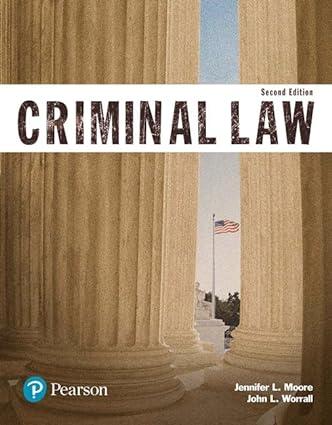Congress has prohibited the provision of material support or resources to certain foreign organizations that engage in
Question:
Congress has prohibited the provision of “material support or resources” to certain foreign organizations that engage in terrorist activity. 18 U.S.C. § 2339B(a)(1) . . . The plaintiffs in this litigation seek to provide support to two such organizations.
Plaintiffs claim that they seek to facilitate only the lawful, nonviolent purposes of those groups, and that applying the material-support law to prevent them from doing so violates the Constitution. In particular, they claim that the statute is too vague, in violation of the Fifth Amendment, and that it infringes their rights to freedom of speech and association, in violation of the First Amendment. We conclude that the material-support statute is constitutional as applied to the particular activities plaintiffs have told us they wish to pursue.
. . . The authority to designate an entity a “foreign terrorist organization” rests with the Secretary of State. She may, in consultation with the Secretary of the Treasury and the Attorney General, so designate an organization upon finding that it is foreign, engages in “terrorist activity” or “terrorism,” and thereby “threatens the security of United States nationals or the national security of the United States.” . . . In 1997, the Secretary of State designated 30 groups as foreign terrorist organizations.
Two of those groups are the Kurdistan Workers’ Party (also known as the Partiya Karkeran Kurdistan, or PKK) and the Liberation Tigers of Tamil Eelam (LTTE). The PKK is an organization founded in 1974 with the aim of establishing an independent Kurdish state in southeastern Turkey. The LTTE is an organization founded in 1976 for the purpose of creating an independent Tamil state in Sri Lanka. The District Court in this action found that the PKK and the LTTE engage in political and humanitarian activities. The Government has presented evidence that both groups have also committed numerous terrorist attacks, some of which have harmed American citizens . . .
Under a proper analysis, plaintiffs’ claims of vagueness lack merit. Plaintiffs do not argue that the material-support statute grants too much enforcement discretion to the Government. We therefore address only whether the statute “provide[s] a person of ordinary intelligence fair notice of what is prohibited” . . .
Congress also took care to add narrowing definitions to the material-support statute over time. These definitions increased the clarity of the statute’s terms. See § 2339A(b)(2) (“ ‘training’ means instruction or teaching designed to impart a specific skill, as opposed to general knowledge”); § 2339A(b)(3) (“ ‘expert advice or assistance’ means advice or assistance derived from scientific, technical or other specialized knowledge”); § 2339B(h) (clarifying the scope of “personnel”). And the knowledge requirement of the statute further reduces any potential for vagueness, as we have held with respect to other statutes containing a similar requirement.
Of course, the scope of the material-support statute may not be clear in every application. But the dispositive point here is that the statutory terms are clear in their application to plaintiffs’ proposed conduct, which means that plaintiffs’ vagueness challenge must fail.
Questions:
1. The plaintiffs make two constitutional arguments regarding the validity of the statute. Identify these two arguments and the constitutional amendments involved.
2. Do you believe the statute infringes on the plaintiff’s constitutional rights? Why or why not?
Step by Step Answer:






